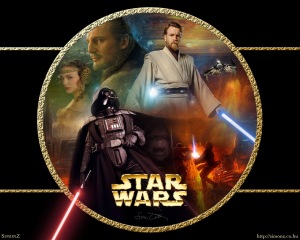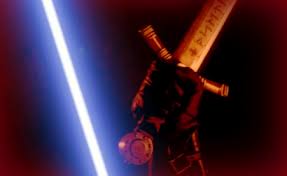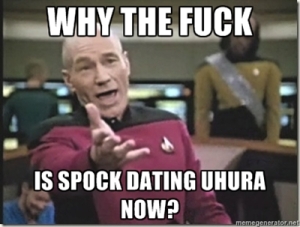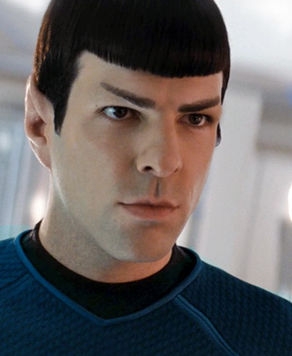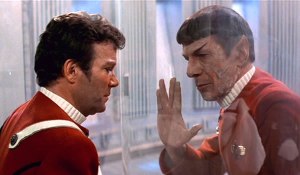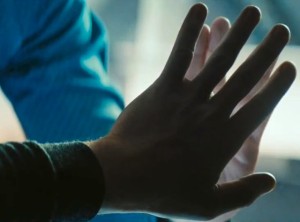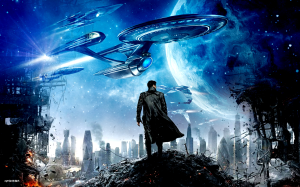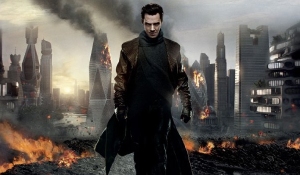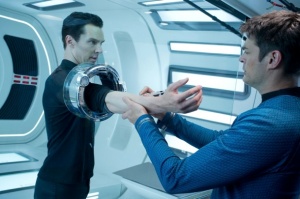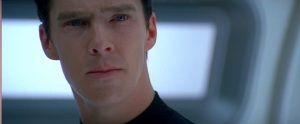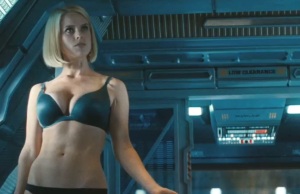Posts Tagged bimbos
Review: Star Trek: Into Boredom Darkness
Posted by Someone in Everything on June 5, 2013

Kirk (Chris Pine) and Spock (Zach Quinto). Yes, what you see is correct, these two have absolutely nothing in common.
Star Trek Into Darkness is a boring, unintelligent throw up ride filled with lens flares and flashy, at-lightening-speed action scenes with handsome, sexy, two dimensional characters flashing their sexiness in front of said lens flares, reciting Star Trek jargon.
This movie was a complete piece of trash as Star Trek.. It was an even worse dumbing down of a great sci-fi franchise to fit the attention span of the Jersey Shore generation than the first one by Abrams. The sheer fact of plagiarizing a past story devoid of all the emotional weight and resonance is probably enough to relegate it there.
J.J. Abrams is obviously a Star Wars fan – everything in this movie (and the one before it) indicates that.
The distinction between the two began to collapse altogether with J. J. Abrams’s first Star Trek film in 2009, and its demise was rendered official with the news early this year that the director would also be taking over future installments of the Star Wars franchise. Abrams’s latest outing, Star Trek Into Darkness represents a final burial.
Let’s face it, the man is not hired to produce quality movies, he is hired to produce marketable junk. And that he did. So much budget and money and all they could come up with was this boring junk of a tourist trinket that absolutely did not add anything to the world of Star Trek. Seriously. Absolutely nothing.
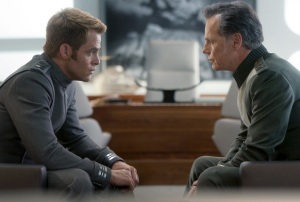
Kirk (Chris Pine) and Pike (Brice Greenwood). Memo to Abrams: Kirk is running out of dads. Time to come up with something else besides revenge and retribution by a frat boy.
The movie ruminates loudly, if never very coherently, about the typical fight of good vs evil that is so central to the theme of Star Wars; about war and peace, vengeance and justice, preemptive attack and negotiated settlement; Kirk and Spock having a destiny to be friends – as if the fabric of the universe as we know it would collapse if these two did not become friends or as if their friendship – among billions out there – was the one that had to transcend time and space. As if their friendship was the Jedi of friendships without which there can never be good in the universe. Completely absurd.
Star Trek never cared for creating messiahs, destinies or holy men and the only time they did (Sisko as the Emissary of the Prophets) turns out that those Prophets the Bajorans prayed to were beings existing on a different plane of existence. No magic was in place. No destiny and messiah.
Why these two need to be friends eludes me. To bring the “force” and balance to the universe? So much so that the one message the old Spock had for humanity in this alternate timeline was not about how to prevent wars and genocides and numerous atrocities but how these two need to remain friends no matter what timeline they are in? So, it is o.k and does not violate the “Prime Directive” to not divulge information regarding other events because that would be interfering with the “destinies” of everyone in the universe, as the old Spock put it, but it is ok to give young Spock and Kirk in this timeline pointers about their friendship that just must transcend time and space?
Star Trek has always been about real people, however, not archetypes fulfilling destinies. Unlike Star Wars,Star Trek is not a fairy tale of good vs evil, heroes vs. villains. In Star Wars everyone is either a guru, a princess, a chosen one but none of them – with the exception of Han Solo – was a real person. They were archetypes fighting the typical fight of good vs evil. Chosen prince vs dark emperor. We never find out what the force really is, what creates it and drives it. It is juts there and the story is about how to make the “force” work for you. That is entering a multitude of fairy tale territories, not science fiction.
Note that science fiction is a “what if” scenario in which the effects of technology or technologies that currently do not exist are explored. Thus, it is “fiction” that revolves around such “science”.
In Star Wars, we do not have any of that. It is neither about humans (since there are no humans in Star Wars, just people called such) nor about the effects of science. In this case, the light saber and hyperdrive may as well be Excalibur and chariots.
Star Trek has never had to rely on magical tricks and such to make the stories work. It’s characters were real. Real people with real problems; with hopes, dreams, goals and careers – not abstract heroes fighting the good fight for the sake of fighting the good fight or taking revenge.
All that has changed ever since Abrams has added his Star Wars flair and preference to the Trek world.
The action sequences are plentiful and characterized by a certain gee-whiz exuberance. This being an Abrams/Lindelof venture, there are multiple sets of Daddy Issues to resolve. And we are subjected to an escalating experiment in the human tolerance for lens flare.
The entire realization and reimagination of the Trek universe is just an insult to Gene Roddenberry and the Star Trek he had imagined starting with The Original Series to all the subsequent shows and movies under Roddenberry’s and then his co-creator Rick Berman‘s supervision. And I am not talking about setup and scenery, I am talking about the themes inherent in Star Trek. This movie does not honor Roddenberry’s vision at all. It is not intelligent or thought provoking. It is not about space exploration and asking the tough questions, it does not truly establish and explore its characters and their relationships with one another, there is no attempt at science, philosophy, morality and in understanding other cultures.
Even the Kirk-dying/Spock-crying scene that was shamelessly stolen from the only Trek movie the writers Kurtzman and Orci seem to have ever seen, The Wrath of Khan, seemed stagey and insincere, not evoking the emotional resonance intended mainly because unlike in the real Trek universe, in this one here, no friendship between Kirk and Spock has ever been established. We don’t see any evidence of that on screen hence Kirk’s apparent death and Spock’s tears seem phony and staged, they don’t affect us.
If it was not for the Star Trek lingo and names of familiar characters, I would not believe that this is a Star Trek production. The plot holes are gaping and the internal consistencies – regardless of past productions – are staggering and too much to ignore. Here are just a few:
1) Apparently orders are purely optional in this here Abrams’ Star Trek. No one follows anyone’s orders. If you don’t wanna follow an order, just resign your commission and hang out in a bar and wait to be reinstated. Don’t worry about a court martial or any kind of consequences. Abrams and his writers have completely failed to understand how military hierarchies work. No wonder Kirk is such a brat and doesn’t follow orders himself, he knows there are no consequences. In fact, everyone, without exception, regularly questions their superior’s orders and decisions, especially Spock who seems to have been programmed with dialog and responses aimed at either reciting some Vulcan life mantra cliches or countering every single thing Kirk says. Frankly, him walking around sounding like a walking dictionary did not help the situation. It did not add to his character or make him more endearing and likable, it just made him look like the ass he is.
2) Mr. Quinto’s idea of being a Vulcan is apparently just having no facial expression. That’s all. Other than that, he’s pretty emotional. Even with a bad script, Nimoy could add just a little something to indicate the depths of his character. Quinto adds nothing. He is mechanical when Spock is logical, and a blubbering tool when Spock is emotional. There’s no middle ground, no subtlety, no mystery. Quinto did not get Spock right at all. He does not inhabit the role. Logic is an attitude, a way of life – you breathe, live, think and walk logic. It’s not just lack of facial expression and pointy ears. Quinto’s Spock with its fake, stagey references to logic and over usage of Star Trek lingo was beyond annoying and obviously placed in there not by people who actually understand, know and care about Star Trek but by people who’ve done their research and are strategically employing the lingo into the script and dialog to make it “Star Trek”.
3) As mentioned above, Kirk and Spock have absolutely no chemistry, and thus no camaraderie, between them. Or maybe it is Pine and Quinto. I don’t know. Something is amiss. There is no basis for their friendship. In fact, there is nothing to indicate in the behavior of either that they even like each other, much less view each other as friends willing to sacrifice themselves for the other – as they did in the end. Nothing in the story indicates that, except for a script that expects us to just fill in the blanks in that regard.
If I had only seen this and the previous movie, I would be absolutely clueless as to why these two are friends. In order for Kirk’s sacrifice to evoke emotional resonance and make us want to care as the audience, it has to have meaning – which is to be found in the friendship. Here, no friendship has been established, only animosity. That was the case in the first movie and it is the case now as well.
In The Wrath of Khan, even if you had seen nothing else from Trek, it was established in several scenes on screen that these guys are life long friends who care a great deal for each other. There are birthday presents, meaningful conversations about life and mortality, there are bonding moments between Kirk and Spock that make their friendship meaningful and give both characters depth and nuances. This, in turn, allows the viewer to put the death scene in context.
Here, there are fistfights explosions and insults. That’s it. This is their “friendship.” So when Kirk sacrifices himself for Spock you cannot help but feel a little lost. It is still unclear to me how Kurtzman and Orci get paid millions to come up with such lousy stories. This is not even about Star Trek or anything, this is just pure story telling – or lack thereof. Characters need to behave in ways that make sense and naturally follow from the story and actions of the characters – not just be implanted there because it is convenient.
Spock neither seems to like nor respect Kirk, is always on his case, always questions him and eventually costs him his commission and the Enterprise (but only temporarily because Pike promotes him back after 10 minutes). Yet, Kirk somehow feels this deep sense of loyalty towards Spock and keeps acting like Spock was his best friend in the world, a man he always could count on to have his back as opposed to a backstabbing bastard who constantly recites regulations and the Dictates of Poetics and what have you to him. At the same time, Kirk constantly dismisses Spock at every turn, and certainly without the humor and camaraderie that infused the original relationship.
When Kirk said “I want you to know why I saved you on the planet,” I thought to myself: “Yeah! Me, too!”
Spock yelling “Khan!!!!” belied the characterization of Spock, as well as being an expression of emotion that was unearned. But more importantly: KHAN WASN’T RESPONSIBLE for the malfunction on the ship that Kirk “sacrificed” himself to rectify. If anything, Spock should have been yelling “MARCUSSSSS!!”
4) I still fail to understand Scotty’s little creature friend who never utters a word and looks as realistic of an engineer as Chewbacca did on Star Wars. The aliens in this new Trek resemble more “creatures” than humanoids brought together under the umbrella of the Federation. The aliens in Star Trek are three dimensional and realistic – the ones in “Wars” are background fillers and clichees – just like all aliens in “Into Darkness”. In fact, except for the obligatory Spock character and the occasional comical strange looking alien in the backdrop, there was not one single alien “character” on here – also very untypical of Trek.
5) Star Trek, unlike Star Wars, is not driven by special effects and CGI. Special effects can’t make you laugh, or cry, or care about anything or anyone. If nearly every scene consists of numbing space battles and CGI monster battles, it just gets tiring. The cacophony of action sequences just got boring after a while and it just felt gratuitous and pointless.
6) Star Trek didn’t have the benefit of metric tons of money to blow on effects (Well, real Star Trek doesn’t, anyway). Instead, it had to make us care about characters, cultures, and organizations. I cared more about Captain Kirk dodging a foam rock than I ever cared about Obi-Wan McGregor fighting General Grievously Stupid. And I also don’t care about Kirk going after the sociopath Khan in this movie either – because I was never given the chance to care about Kirk in the first place.
Watching scene after scene of “pew-pew-pew-KABOOM!” just is not appealing to me. And that is the problem: nothing intelligent happens in this movie. There are battles and wars every once in a while in Star Trek, but mostly, there are science fiction stories that describe the universe and its societies, instead of blowing them all up.
7) The Klingons and Kronos: the former looked nothing like the Klingons we have ever seen in any Trek version and Kronos looked like a freaking sound stage. The bridge of the Enterprise still looks like a Bloomingdale’s make up counter and more technologically advanced than the slip stream drive ships of 2378 in Star Trek: Voyager. Dialog and “character” development consist of “Bones” making a weird face and cracking lame jokes, putting a newbie in charge of engineering because the chief engineer decided to not follow orders and Uhura making the brilliant observation and complaint about Spock having no feelings and not showing them to her. Well, no NO KIDDING GENIUS. When did that occur to you? When he said he was VULCAN and on his way to embrace only logic?
8) Overall, the aliens, the action scenes and overall demeanor of the show resembled more a Star Wars meets Transformers meets Jack Bourne production than Star Trek. The story did not revolve around the effects that these technologies, such as eugenics in this case, have or had on Humans and their society. In fact, they did not explore, comment on or critique the Eugenics wars at all – something which is a central theme for the Khan arc and especially central to the concept of Star Trek – which is all about how technology and science affect humans/humanoid civilization and life as opposed to just chasing down archetypes of bad guys while rewarding the “good guys.”
9) Most of the movie does not even take place on space. In fact, space just seems to be the incidental backdrop. There is nothing in this movie, other than the Trek jargon borrowed from previous movies – but out of context – to make us think this is a Trek production or in any shape or form even remotely related to Gene Roddenberry’s and later Rick Berman’s vision. This is Star Trek the way only the Jersey shore generation could imagine it: dumb, superficial, cheeky and devoid of substance.
10) Boy the directors must have studied Memory Alpha since their new favorite word used was the Prime Directive. And don’t even get me started on the Section 31 garbage stolen from DS9 and misplaced in this universe. And then that “permission to come on the bridge” garbage by a stowaway bimbo in a short skirt whose principle role in the film is to appear briefly in her underwear, thus achieving the dual purposes of supplying Kirk with a romantic interest for the next installment and also being an expert in weapons of mass destruction? WTF? Asking for permission to enter the bridge during an emergency/red alert situation is also especially rich coming from an intruder and a movie and writers who treat orders given by commanding officers as merely optional for the characters to follow.
11) One of my expectations, which is apparently a foolish one, was that the iconic Khan Noonian Singh, a Sikh character, would not be whitewashed and played by a white, British guy, Benedict Cumberbatch, but by someone of East Indian descent or maybe at least someone resembling someone from such a background. With his casting choice of a Caucasian man in the form of Cumberbatch, J.J. Abrams has proven that he doesn’t even humor us anymore. He didn’t even attempt to make the character at least resemble someone with East Indian origins. He just went straight for the white guy. If I had not seen The Wrath of Khan or known anything about the Khan character pre this movie I would be seriously dumbfounded watching this and wondering why a guy named “Khan Noonian Singh” is being played by a 100% white guy.
Roddenberry’s vision, I think not.
Now before people jump my throat saying that the original Khan wasn’t played by an East Indian either, consider this: back in the 60s, when Ricardo Montalbán was cast to play Khan (a character explicitly described in the episode script of “Space Seed” as being Sikh, from the Northern regions of India), he had huge racial barriers and bigotry to overcome in a society where racism and segregation were institutionalized. The pressures Roddenberry faced from the television networks to cast “sensibly” as he put it were immense and serious and are well documented. Therefore, for the 60s and the times he was in, having a brown-skinned man (Montalbaná) play a brown character was a hard-won victory.
Fast forward some 40+ years later where apparently despite all our changes as a society supposedly embracing diversity, inclusion and otherness, we see that not only has nothing changed with respect to executive demands for “sensible” casting, but we see that said producers and film makers are not even trying to hide their attempts at bigotry.
Just this week Abercrombie and Fitch was under fire (as they have been for years now) for portraying their brand and image towards the run-of-the-mill homogenous blonde, blue eyed, chiseled-ab folks. Yet here we got a movie that does exactly the same thing, and people think it’s a hit and brilliant and supposedly so very true to Gene Roddenberry’s vision.
Really?
It’s disappointing and demoralizing that with the commercial power of Star Trek in his hands, JJ Abrams chose not to honor the original spirit of the show, or the symbolic heft of the Khan character, but to wield the whitewash brush for … what? The hopes that casting Benedict Cumberbatch would draw in a few more box office returns?
12) The characterization of Khan in this movie was just plain wrong and reduced Khan just to the archetypal villain as opposed to a complex, brilliant character. The Khan from Space Seed was ruthless, but he wasn’t cruel for cruelty sake. He was a tyrant, not a sociopath, and there’s a big difference. He marooned the crew of the Reliant, he didn’t kill them. in cold blood. Khan in this movie, on the other hand, crashing the ship and, in particular, the -violence on the bridge of the Vengeance was really awful and depicted Khan as nothing but the archetypal villain rather than the intelligent, brilliant, and ferocious man that he was.
Overall I think that as a story about revenge and anger (if you don’t care about anything else and are a teenager, that is) it’s pretty OK. Khan is a maniac terrorist. Boo, we hate terrorists. Check. Kirk hates this particular terrorist because he gunned down his surrogate daddy. Yay, we like revenge! Check. Love story between the withholding man and hot woman who is crazy about him. We love love stories. Check. Obligatory blonde model-slash-actor superfluous character to add a young and sexy “edge” to the show plus a possible love interest for Pine, Yaay! We all want to see him shirtless and hooking up with a blonde bimbette/model -slash -actor, yaay! Check.
I guess it works on a very broad scale. But the question now is, how many more vengeance and anger stories can be told? How many more times can Kurtzman and Orci watch the Wrath of Khan to extract another absurd plot line out of it? Kirk is running out of daddies, and now death can be cured with a handy injection, whatdo’ya know. Isn’t that nifty?
Since this was a reboot of the franchise and conveniently taking place in an alternate timeline, the writers were given a white canvas to work with and come up with new ideas and ways to imagine the Trek Universe and take our heroes on journeys they have not gone on yet, not rehash the past and redo something, such as The Wrath of Khan, that was brilliantly done to begin with and did not need redoing.
Alas, there are strange alien monsters to be chased, fugitive baddies to capture, Klingons to stare down, and special effects budgets to be spent. Therefore, enter the openly dizzy way that is Star Trek as only a Star Wars business-man fan-boy can imagine it, namely as a more recognizable heir to George Lucas than to Gene Roddenberry.
(As a side note: I am tired of hearing people excuse all the crap writing and lousy inconsistencies as “well it is the parallel universe.” So what? You don’t need to create engaging characters we care about, internal consistency, great story telling and a great script because it is the parallel universe? Or alternate timeline?)
In the end when Khan had his torpedoes or whatever directed at “Enterprise” I was really hoping he kills all these losers and puts an end to this terrible reimagination of the Star Trek franchise by a Star Wars fan.
